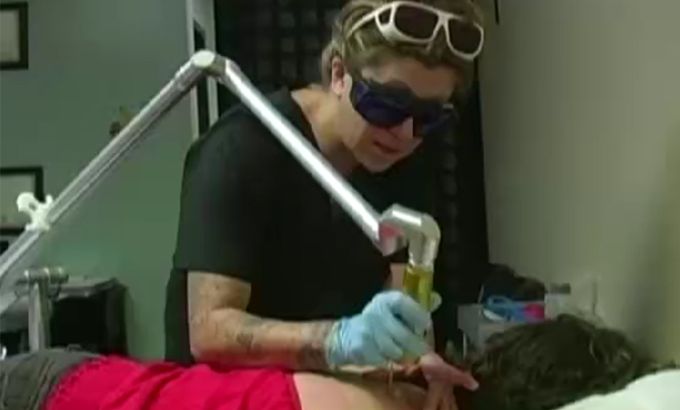A healing path for victims of ‘branding’
US woman offers free tattoo removal for victims of abusive relationships forced into getting them.

Published On 25 Aug 2013
She calls herself “Victoria“. It gives her a level of protection when she talks – as if the shame and pain belong to someone else.
She first met the man when she was 15 years old. She was walking with friends in a local shopping mall when he told her he was going to date her.
She laughed. “He was much older than me, maybe 23. And he wasn’t good-looking.” But he was persistent. And threatening. He told Victoria that if she didn’t agree, he’d come to her house and blast his music loud and shout her name.
She suffered the natural embarrassment of a teenager, and so agreed to a quick date. However, soon she was caught in an abusive relationship. He would beat and degrade her, humiliate and demean her, all to stop her from walking away.
And the psychological pressure worked. She became too frightened to step through the door; too scared to tell her parents what was going on and too worried what might happen if she left.
Then one night, her boyfriend decided he was going to let everyone know Victoria was not just his girlfriend, but his property. “He branded me,” she says. He used a homemade mixture of ink, pencil lead and other ingredients to carve his name on her skin – tattoos he thought she would always carry. He made his mark on her breast, her back, her ring finger, her hand and just above her vagina.
“He threatened me. He said if you don’t get these tattoos, you’re going to get the beating of your life. And you know I didn’t want a beating, because I’d already experienced it. So it was more like you’re going to sit still and let me tattoo you, and if you fight back then it’s gonna get ugly. So I just had to sit there and endure it.”
Victoria, a pretty, bright, engaged young woman, insists that she felt helpless. She knew what he was doing, and tried to block it out. “I was praying that there was a way I could escape, and the only way to do that was detach myself from being there, mentally,” she said. “The only way I could go through it was disassociating myself from the event. It was that hard.”
The tattoos made her ill. Not because of what was in the ink, but because she hated that every time she undressed or went to the bathroom, there was a reminder of what had happened and the man who had done it. She would avoid going to public restrooms, holding it in – and that developed into an urinary infection.
Eventually Victoria got away, although she doesn’t go into very much detail about how. Then one night, she heard about Dawn Maestas. From her little shop in Albuquerque, New Mexico, Maestas was offering tattoo removal for victims of domestic abuse. She called and asked how much it would cost. Maestas told her it was free.
Maestas started offering the service because she was herself a victim of abusive relationships. “I had a real emotionally abusive time with my dad, and from there I fell into one abusive relationship after another,” she explained.
She found out about a course training people to remove tattoos, and signed up. She practiced on herself. She started to remove a tattoo with the name of a former partner who had treated her badly. That’s when things started to fall into place.
“As the tattoo started to disappear, I realised that there was this elevation or this lightning that was taking place within myself – that it had become this very important purpose to remove this person’s name who had caused so much harm to my life,” she said. “I became very excited as the tattoo slowly disappeared, and then one day to have it removed. It felt like final closure, it felt like I had made it past – that this person was no longer affecting my life.”
Maestas offered her services to others, and was shocked by some of the things she saw and the stories she heard. “These are not just tattoos, this is a form of branding,” she told Al Jazeera, wiping away the tears that had started to fall, “and it can be done in all types of ways. I tell everybody this is the superficial, this is what’s on top. We should be extremely concerned about the acts and events that took place that caused these types of brands to take place. There are so many horrific stories that are underneath.”
Maestas has treated dozens of victims in New Mexico, but has also heard from women all over the US. She reckons there are hundreds if not thousands of victims who have been branded by a so-called loving partner.
And Victoria? She credits Maestas for changing her life. “I can’t even explain the feeling,” she said. “Like oh my gosh, I’m not stuck feeling like this, I can get them off, and I can go back to my normal life.”
Now, Victoria has signed up to join the Marines. “Basic training can’t be harder than what I’ve already gone through,” she said.
Source: Al Jazeera